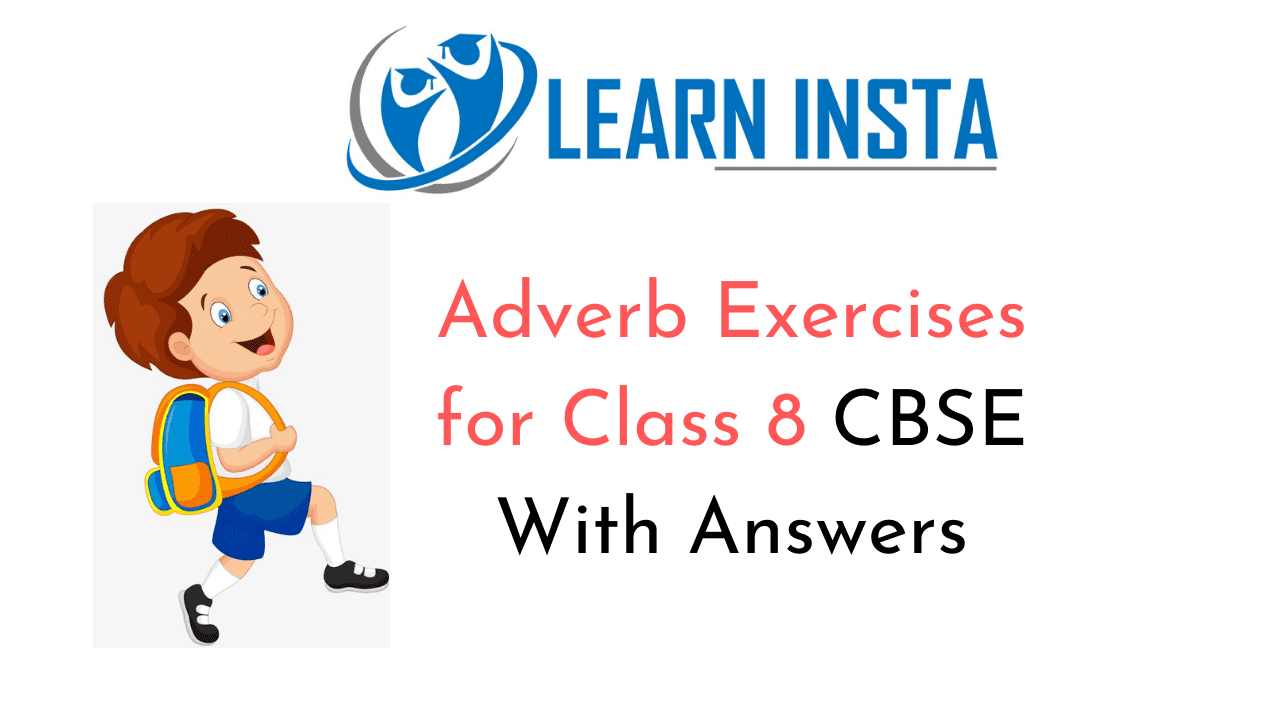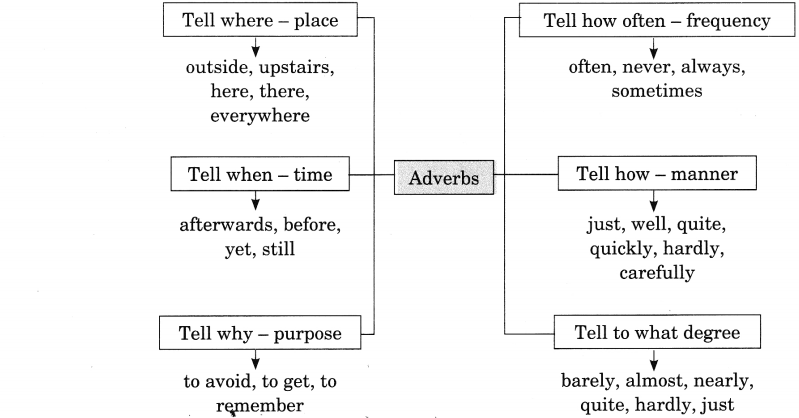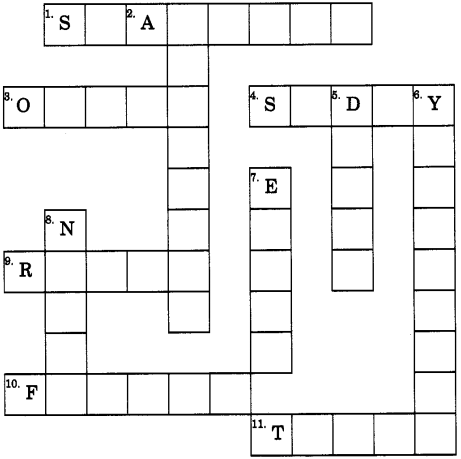
Definition of Adverb
Adverb can be defined as “A word or phrase that modifies the meaning of an adjective, verb, noun, determiner, or other adverb, expressing manner, place, time, or degree (e.g. gently, here, now, very). Some adverbs, for example ‘sentence adverbs’, can also be used to modify whole sentence”.
This grammar section explains Online Education English Grammar in a clear and simple way. There are example sentences to show how the language is used. NCERT Solutions for Class 8 English will help you to write better answers in your Class 10 exams. Because the Solutions are solved by subject matter experts. https://ncertmcq.com/adverb-exercises-for-class-8/
Or,
“A word that describes or gives more information about adverb, adjective, adverb, or phrase”. We can easily identify the availability of adverb in the sentence by seeing its function. If any word in the sentence is describing any of the parts of speech (verb, adjective or other adverb), it is an adverb. We can also recognize the availability of adverb in the sentence by looking the end of word (ending with ‘ly’).
An adverb is a word or phrase that modifies the meaning of a verb, an adjective or another adverb. Adverbs generally give information about the manner, place, time, frequency, degree, and reason of the action. An adverb is a word or phrase which modifies a verb, an adjective or another adverb.
Online Education Adverb Exercises for Class 8 CBSE With Answers Pdf
Adverb Exercise For Class 8
Some frequency words like very, more, much, many, etc are also adverbs.
For example:
- I placed the flower pot carefully on the table. (‘carefully’ word is an adverb in this sentence and shows the example of how action is performed)
- My friend walks gracefully. (‘gracefully’ word is an adverb in this sentence and shows how to modify the meaning of verb)
- I run fast. (“fast word is an adverb and provide more information about verb)
- I always eat healthy food. (‘always’ word is an adverb and modifies the verb to eat)
- I saw a very pretty girl in the car. (‘very word is an adverb)
- I will eat there. (‘there’ word is an adverb)

There are different kinds of adverbs expressing different meaning. The following are some of the common ones.
Adverb Class 8
1. Adverb of time: An adverb of time tell us when something is done or happens. We use it at the beginning.
Adverbs of time include afterwards, already, always, immediately, last month, now, soon, then, and yesterday.
Examples:
- He collapsed and died yesterday.
- His factory was burned down a few months ago.
- Last week, we were stuck in the lift for an hour.
Adverbs Class 8
2. Adverb of place: Adverb of place is an adverb which tells us about the place where something is done or happens in the sentence. It is used generally after the verb, object or end of the sentence. Adverbs of place are like below, here, above, inside, outside, there, over there, under, upstairs, etc.
For example:
- We need to stop here for dinner.
- He was eating under the table.
- A bird fly above in the sky.
Adverb Exercises For Class 8
3. Adverb of manner: An adverb of manner tells us how something is done or happens. Most adverbs of manner end in -ly such as badly, happily, sadly, slowly, quickly, and others that include well, hard, fast.
Examples:
- The brothers were badly injured in the fight.
- They had to act fast to save the others floating in the water.
- At the advanced age of 88, she still sang very well.
Adverbs Exercises For Class 8
4. Adverb of Degree or Quantity: Adverb of degree or quantity is an adverb which tell s us about the level or extent of something is done or happens in the sentence. It is used before the adjective or adverb. Adverbs of degree or quantity are like almost, nearly, quite, much, really, too, very, so, etc.
For example:
- It was too hard task for us to complete. (adverb is used before adjective)
- I am quite.
- I am feeling really sad for my friend’s father death.
Adverbs For Class 8
5. Adverb of frequency: An adverb of frequency tells us how often something is done or happens. Words used as adverbs of frequency include again, almost, ever, frequently, generally, hardly, ever, nearly, always, never, occasionally, often, rarely, seldom, sometime, twice, usually and weekly.
Examples:
- They were almost fifty when they got married.
- He hardly ever say something nice to his wife.
- While overseas, he frequently phoned home.
- She is not nearly always right although she thinks she is always right.
- He complained that she never smiled back.
Adverb For Class 8
Adverbs of Purpose
Adverbs of purpose express the purpose of an action.
Commonly used adverbs of purpose are hence, consequently, therefore, thus.
The following phrases are also used as adverbs of purpose: in order to, on account of, so that.
Mona often tells lies. Hence, no one believes what she says.
Mira buys her clothes during sales. Consequently, she gets them at a very low price.
Niren lost his scholarship. He, therefore, left college.
The match was postponed on account of rain.
I stopped the car in order to ask for directions.
Adverb Exercises Solved Examples for Class 8 CBSE
Exercise On Adverbs For Class 8 Question 1.
Fill in the blanks
| slowly – carefully – beautifully – well – loudly – carelessly easily – excitedly – finally – suddenly – quickly – quietly |
(i) Come here ____________ you have to see this!
(ii) We knew that she had got the job when we saw her ____________ talking on the phone.
(iii) He ____________ put the vase on the table. It fell to the floor.
(iv) Sharon is throwing a party on Saturday. She ____________ finished her PhD.
(v) Let’s walk ____________ I don’t want to be the first one at the meeting.
(vi) Alex ____________ put up the bookshelves. It was too difficult for me to do on my own.
(vii) Everything happened so ____________ We had to move to California in less than a month.
(viii) Why does he always have to talk so ____________ you can hear him in the next room!
(ix) Although she speaks five languages, she did not do ____________ on the translation exam.
(x) I was so surprised. His new apartment was ____________ decorated.
Answer:
(i) quickly
(ii) excitedly
(iii) carelessly
(iv) finally
(v) slowly
(vi) easily
(vii) suddenly
(viii) loudly
(ix) well
(x) beautifully
Adverbs Class 8 Worksheet Question 2.
Identify the adverb in each of the following sentences.
(i) They spoke loudly.
(ii) I am highly impressed with her presentation.
(iii) She looked quite nervous.
(iv) Radha works diligently in order to get promoted.
(v) Fox is often believed to be cunning animal.
(vi) Barking dogs seldom bite.
(vii) Earlier, they used to travel in their car.
(viii) The birds were chirping merrily.
(ix) I sometimes go for a walk in the park.
(x) He never came to my place to visit me.
Answer:
(i) loudly
(ii) highly
(iii) quite
(iv) diligently
(v) often
(vi) seldom
(vii) earlier
(viii) merrily
(ix) sometimes
(x) never
Adverbs Exercises For Class 8 With Answers Question 3.
Use appropriate adverbs of degree (a bit, a little, very, extremely or pretty) according to the context of the sentences given below.
(i) I am ____________ tired. But I will definitely try to come with you.
(ii) I am not able to make out the answer. It is ____________ confusing.
(iii) The boy found the girl ____________ ugly and disagreed to marry her.
(iv) The arrangements of the birthday party were ____________ nice. One could not help, but appreciate them.
(v) We can think of some other place. This one is ____________ boring.
(vi) The paintings and carving at Ajintha and Verul are ____________ beautiful.
(vii) The audience were ____________ spell bound. They liked the speech much.
(viii) He slowed down the speed ____________ that he might not meet with an accident.
(ix) This building is ____________ Lold. It look like a haunted place now.
(x) She sings ____________ well. She can try her hand at singing.
Answer:
(i) a little / a bit
(ii) very
(iii) extremely
(iv) extremely
(v) a little
(vi) very / extremely
(vii) extremely / very
(viii) a little
(ix) very
(x) pretty
Adverb Exercises Practice Examples for Class 8 CBSE
Adverb Exercises For Class 8 With Answers Question 1.
Use the following adverbs of time to fill in the blanks in the following sentences correctly.
| When – just – after – then – yet Ltil – now – already – while – before |
(i) Renu makes some mistakes ____________ she writes.
(ii) ____________ talking to you, I changed my mind.
(iii) It was right ____________ that Ahana decided never to bring up the topic again.
(iv) The post will be collected ____________ 4 p.m.
(v) ____________ when I thought he wasn’t going to come, he showed up.
(vi) He has ____________ started training for next year’s half marathon.
(vii) The selectors haven’t ____________ finalised the team for the series.
(viii) We will not go to the cinema ____________ you get here. ____________ that I’m earning, I can save up to visit my friend in London.
(x) I washed the dishes ____________ listening to music.
Adverb Class 8 Worksheet Question 2.
Fill in the blanks by choosing the appropriate adverbs.
(i) I have heard this ____________.
(a) now
(b) before
(c) never
(d) since
(ii) I have told you ____________.
(a) never
(b) twice
(c) seldom
(d) fully
(iii) This story is written ____________.
(a) surely
(b) certainly
(c) well
(d) once
(iv) She sings ____________.
(a) delighted
(b) delightfully
(c) already
(d) never
Adverbs Exercise For Class 8 Question 3.
Complete the crossword with the help of the clues.

Across
1. Karan worked at his sums ____________ for an hour without a break.
3. Arjun ____________ stops at the corner shop to buy an ice-cream. He loves the ones you get there.
4. Opposite of happily
9. Kavita went to school ____________ She rarely missed a day.
10. An adverb of manner that has two es and begins with the letter after
11. Form an adverb from the abstract noun ‘truth’.
Down
2. Our school magazine is printed ____________ It comes out once a year.
5. I know what is happening in my city because I read the newspaper ____________.
6. If Present = Today, Future = Tomorrow, Past = ____________.
7. The chief guest came ____________ We were not ready for her.
8. Hari dislikes water intensely. He says he will ____________ learn to swim.